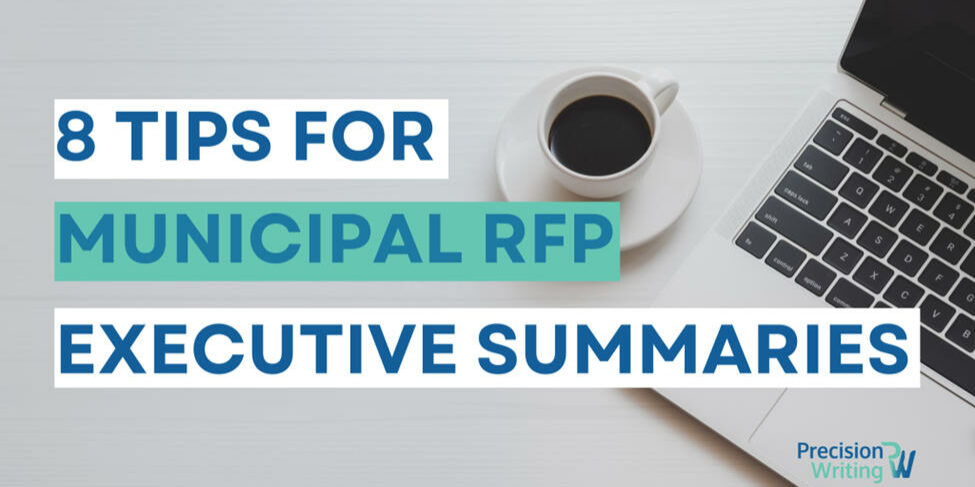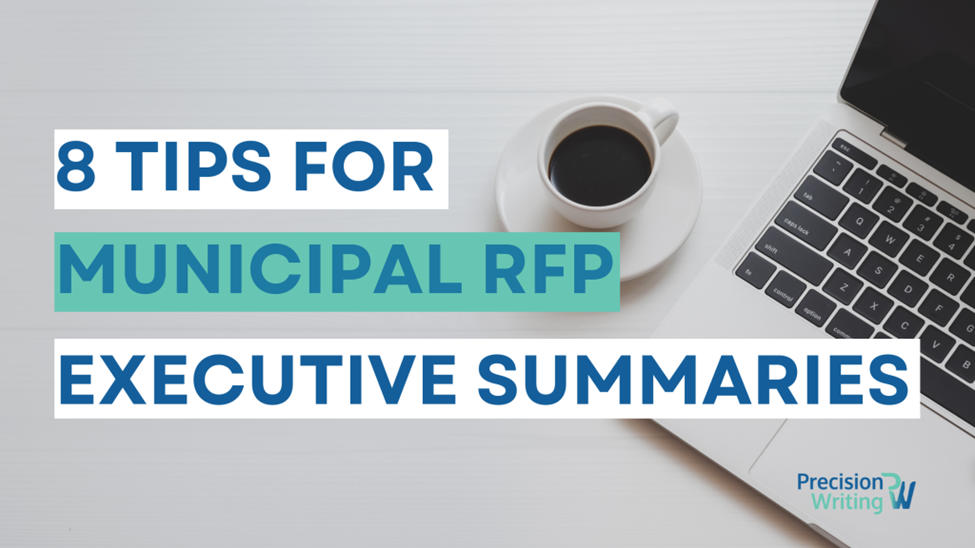Executive Summaries – 8 Tips To Writing Winning Municipal RFP Responses

by Alexandra Harrison | July 26, 2023

In the competitive world of municipal Request for Proposal (RFP) responses, securing contracts requires finesse and skill. One vital element that can make or break your proposal is the Executive Summary. A well-crafted Executive Summary not only captivates evaluators but also serves as a crucial entry point to impress potential clients and stakeholders. In this blog post, we will delve into proposal writing best practices to create a compelling Executive Summary that paves the way to success in the dynamic municipal RFP landscape.
1. Understanding the Power of Executive Summaries:
The Executive Summary is the gateway to your entire proposal. It is the first section evaluators read, so it must succinctly convey your proposal’s essence. Keep it clear, concise, and captivating, with a focus on highlighting the most significant aspects of your submission.
2. Tailoring Executive Summaries to the Municipality:
Avoid using generic templates for your Executive Summaries. Each municipality has unique needs and preferences. Tailor your summary to address their specific pain points, requirements, and goals. Personalizing your approach demonstrates a keen understanding of the municipality’s challenges and positions your proposal as the ideal solution.
3. Showcasing Unique Value Propositions:
Highlight your proposal’s unique selling points and competitive advantages. Whether it’s innovative technology, cost-saving strategies, or expertise in handling similar projects, make it stand out. A compelling value proposition can set you apart from competitors and leave a lasting impression on evaluators.
4. Keeping it Concise yet Comprehensive:
While it’s crucial to be informative, remember that brevity is key. Keep Executive Summaries within two to three pages, avoiding unnecessary jargon or fluff. Ensure that even someone unfamiliar with your proposal can grasp the main points quickly.
5. Demonstrating Expertise and Experience:
Municipalities want to partner with firms that have a proven track record of success. Include relevant project highlights and past accomplishments in your Executive Summaries. This reinforces your expertise and instills confidence in evaluators about your ability to deliver results.
6. Addressing Risks and Mitigation Strategies:
Risk assessment is an integral part of any project. Acknowledge potential risks in your Executive Summaries and outline proactive mitigation strategies. This portrays your team as proactive problem solvers who can navigate challenges effectively.
7. Emphasizing Local Impact and Sustainability:
Many municipalities prioritize local impact and sustainability. Showcase how your proposal aligns with their values and contributes positively to the community. Addressing these aspects can resonate deeply with evaluators and increase your chances of success.
8. The Power of Proofreading and Editing:
Grammatical errors and typos can undermine even the most exceptional proposals. Always proofread and edit your Executive Summaries meticulously to ensure professionalism and accuracy.
Crafting winning Executive Summaries for municipal RFP responses is a skill that can significantly impact your success in the proposal writing industry. By tailoring your approach, showcasing unique value propositions, and addressing municipality-specific needs, you can create an Executive Summary that captivates evaluators and secures valuable contracts. Remember, the Executive Summary is not just a summary—it’s the hook that reels in potential clients and sets the stage for your proposal’s triumph.
Popular Posts
External Articles
Footer
Let's talk about your needs

Services
Quick Links
Get Social
Be sure to follow us on social media to stay up-to-date on what is happening with your company.
© All rights reserved by Precision Writing.



